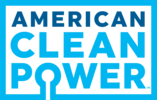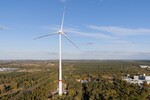News Release from American Clean Power Association (ACP)
Wind Industry Profile of
09/26/2011
AWEA Blog: "Don't increase taxes on clean energy"
Kansas Gov. (and former U.S. Senator) Sam Brownback (R) had some thoughtful words on this issue in a recent opinion article that appeared in the Wichita Eagle and Bloomberg Government. In the article, Gov. Brownback strongly supported an extension of the existing federal Production Tax Credit for wind—thereby opposing a tax increase on this promising new energy industry that is generating clean, affordable, homegrown electricity, creating jobs, and providing an economic shot in the arm to farmers, ranchers, and rural communities across America.
According to Gov. Brownback, "Experience has taught us that investment in the renewable-energy economy is creating jobs across all employment sectors, including construction, engineering, operations, technology and professional services, in both rural and urban communities." The Governor also expressed strong support for building new transmission lines to export wind-generated electricity from midwestern states to population centers in the eastern U.S., "thereby providing access to clean, reliable and affordable energy for millions of customers."
So, point 1: At this critical economic juncture, the federal government should not increase taxes on an emerging energy industry that is showing very strong potential for growth and employment. Having accounted for 35 per cent of all of the new electric generating capacity installed in the past four years, wind is a proven commercial energy source, and the existing tax credit has been extremely successful in leveraging private funds to help it grow.
Point 2: Policymakers should push for a clear accounting for all of the costs of our energy.
The reasoning for this is nicely expressed by former Republican Congressman Bob Inglis (R-SC) in another recent opinion article, in USA Today: "[M]arkets can't respond when some fuels escape accountability. If the coal industry, for instance, were held accountable for all of coal's costs — including health effects — we'd build emission-free nuclear power plants instead of coal-fired plants. Electricity rates would rise because we'd be paying all of coal's cost at the meter, but health insurance premiums would fall. In such an all-costs-in scenario, the profit motive would drive innovation just as it drove innovation with the Internet and the PC — without clumsy government mandates.
"Conservatives can restore our objectivity by acknowledging that Americans are already paying all the hidden costs of energy. We can prove our commitment to accountability by properly attaching all costs to all fuels. We can prove our belief in free markets by eliminating all subsidies and letting the free enterprise system sort out winners and losers among competing fuels."
And finally, point 3: In fairness, consideration of federal support for energy sources should include a historical perspective. A recent report from DBL Investors, briefly described below, explains why.
Policies based on these three principles—don't raise taxes on emerging energy industries, account for all-in costs of all energy sources, and provide equitable treatment among energy sources—would go a long way toward building an energy policy and production system that could meet our country's energy needs, now and in the future.
The report, “What Would Jefferson Do?,” from DBL Investors, is among the first and best attempts to make an “apples to apples” comparison of federal incentives for fossil fuels, nuclear and renewable sources of energy .
What may surprise some is that the study finds “that current renewable energy subsidies do not constitute an over-subsidized outlier when compared to the historical norm for emerging sources of energy. For example: … the federal commitment to [oil and gas] was five times greater than the federal commitment to renewables during the first 15 years of each [subsidy’s] life, and it was more than 10 times greater for nuclear."
The report concludes, “Looking at the history of American energy subsidies, a strong case can be made that in order to drive the next generation of energy technology, the federal government needs to continue its support for renewables, in line with our historical commitments to innovation.”
I completely agree. Denise Bode
According to Gov. Brownback, "Experience has taught us that investment in the renewable-energy economy is creating jobs across all employment sectors, including construction, engineering, operations, technology and professional services, in both rural and urban communities." The Governor also expressed strong support for building new transmission lines to export wind-generated electricity from midwestern states to population centers in the eastern U.S., "thereby providing access to clean, reliable and affordable energy for millions of customers."
So, point 1: At this critical economic juncture, the federal government should not increase taxes on an emerging energy industry that is showing very strong potential for growth and employment. Having accounted for 35 per cent of all of the new electric generating capacity installed in the past four years, wind is a proven commercial energy source, and the existing tax credit has been extremely successful in leveraging private funds to help it grow.
Point 2: Policymakers should push for a clear accounting for all of the costs of our energy.
The reasoning for this is nicely expressed by former Republican Congressman Bob Inglis (R-SC) in another recent opinion article, in USA Today: "[M]arkets can't respond when some fuels escape accountability. If the coal industry, for instance, were held accountable for all of coal's costs — including health effects — we'd build emission-free nuclear power plants instead of coal-fired plants. Electricity rates would rise because we'd be paying all of coal's cost at the meter, but health insurance premiums would fall. In such an all-costs-in scenario, the profit motive would drive innovation just as it drove innovation with the Internet and the PC — without clumsy government mandates.
"Conservatives can restore our objectivity by acknowledging that Americans are already paying all the hidden costs of energy. We can prove our commitment to accountability by properly attaching all costs to all fuels. We can prove our belief in free markets by eliminating all subsidies and letting the free enterprise system sort out winners and losers among competing fuels."
And finally, point 3: In fairness, consideration of federal support for energy sources should include a historical perspective. A recent report from DBL Investors, briefly described below, explains why.
Policies based on these three principles—don't raise taxes on emerging energy industries, account for all-in costs of all energy sources, and provide equitable treatment among energy sources—would go a long way toward building an energy policy and production system that could meet our country's energy needs, now and in the future.
The report, “What Would Jefferson Do?,” from DBL Investors, is among the first and best attempts to make an “apples to apples” comparison of federal incentives for fossil fuels, nuclear and renewable sources of energy .
What may surprise some is that the study finds “that current renewable energy subsidies do not constitute an over-subsidized outlier when compared to the historical norm for emerging sources of energy. For example: … the federal commitment to [oil and gas] was five times greater than the federal commitment to renewables during the first 15 years of each [subsidy’s] life, and it was more than 10 times greater for nuclear."
The report concludes, “Looking at the history of American energy subsidies, a strong case can be made that in order to drive the next generation of energy technology, the federal government needs to continue its support for renewables, in line with our historical commitments to innovation.”
I completely agree. Denise Bode
- Source:
- American Wind Energy Association / www.awea.org/blog/
- Author:
- Posted by Trevor Sievert, Online Editorial Journalist / By Denise Bode, www.awea.org/blog/
- Email:
- windmail@awea.org
- Link:
- www.awea.org/...
- Keywords:
- awea, wind, wind energy, wind turbine, rotorblade, awea, ewea, wind power, suppliers, manufacturers, renewable energy, trevor sievert

























